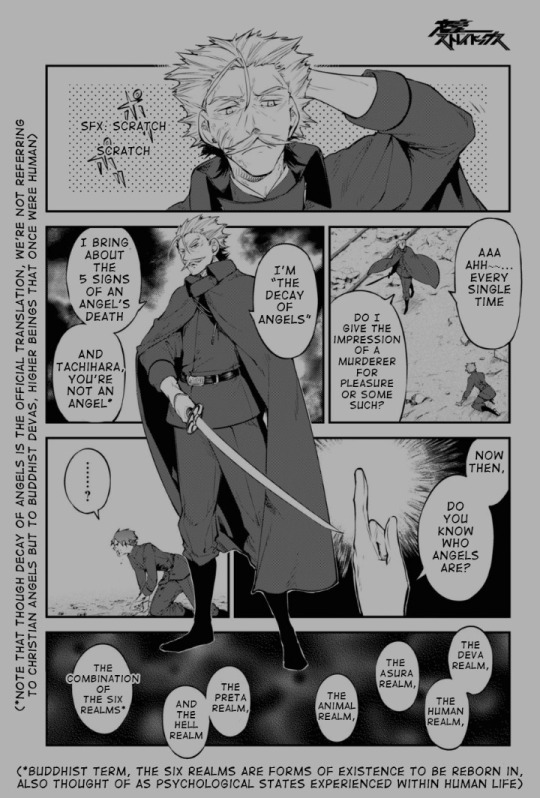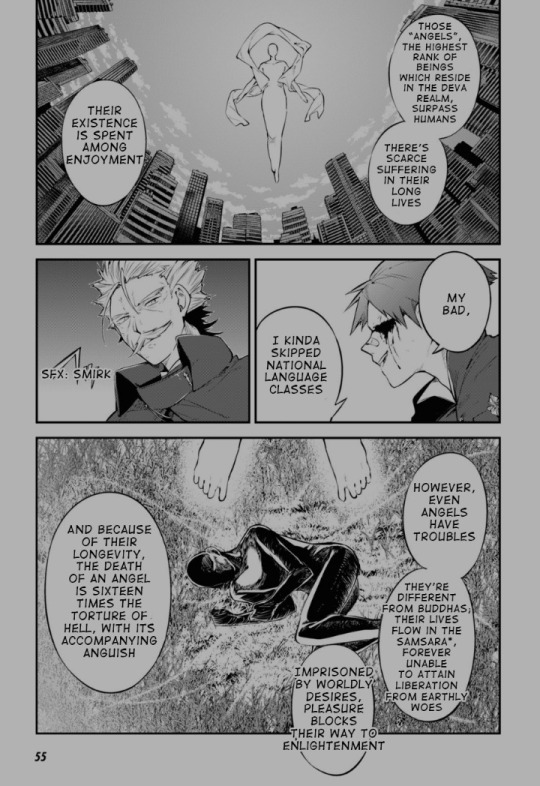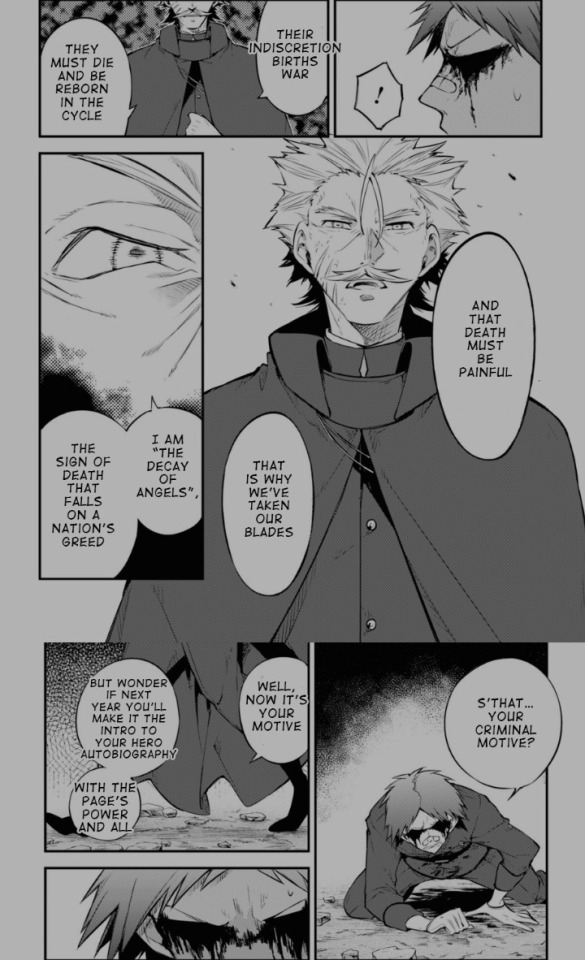#me: sure i'll read this book about the buddha's wife
Explore tagged Tumblr posts
Text
Born a month apart, she and Siddhartha had known each other since they were infants. Their nicknames, Ushas and Surya, had come from the way her cousin had tottered after her in those early years, like Surya, the Sun, following his beloved Ushas, Dawn, across the sky.
- Mansions of the Moon, Shyam Selvadurai
#mansions of the moon#shyam selvadurai#book nerd#me: sure i'll read this book about the buddha's wife#me: wow everything hurts
1 note
·
View note
Text
The Six Realms
Okay, so I was pretty close to giving up on writing analyses but I'm back LMFAO plus I see we're close to 100 followers and I just want to thank you guys for being so very supportive <3
Alright, I'm not sure if anyone's ever written about this, but if an analysis like this exists, please do let me know because I'm kind of curious as to what other people think about this, too!
Remember that time Fukuchi spoke about bringing "about the five signs of an angel's death"?

I read a little bit more about it, and as a minor content warning: this analysis will focus on a few religious aspects (Buddhism + Hinduism). So if I get any of the facts wrong, firstly: I do not mean any disrespect to either religion, and secondly: please do correct me if I interpret anything in the wrong way.
Spoilers for BSD chapter 90 onwards + BEAST!AU under the cut!
So I'll start by talking about the Decay of Angels. As we all know, the members include Fyodor Dostoyevsky, Nikolai Gogol, Sigma, and Bram Stoker, and their leader, Fukuchi Ochi. After Fyodor's arrest, the Decay of Angels came into light with Nikolai murdering four government officials in a week. These murders symbolise the Buddhist cycle of existence, or otherwise known as samsara: the cycle of life, death, and rebirth.
"We are the Decay of Angels—hiding here as terrorists, a 'murder association', five people who will announce the demise of the celestial world."
Nikolai Gogol, chapter 57
Samsara is described to be a concept beyond human understanding. According to Hinduism, samsara is the physical world where every being has its soul trapped into a physical vessel. The Hindus believe that everything has a soul, and due to a soul's attachment to desire, it is forced into a deathless cycle of being born, dying, and reincarnating into a different body. In Buddhism, the ultimate way to break free from this cycle is by obtaining nirvana.
Nirvana is a Sanskrit word for the goal of the Buddhist path: enlightenment or awakening. In Pali, the language of some of the earliest Buddhist texts, the word is nibbana; in both languages it means "extinction" (like a lamp or flame) or "cessation." It refers to the extinction of greed, ill will, and delusion in the mind, the three poisons that perpetuate suffering. Nirvana is what the Buddha achieved on the night of his enlightenment: he became completely free from the three poisons. Everything he taught for the rest of his life was aimed at helping others to arrive at that same freedom.
- TRICYCLE'S definition of nirvana
As Fukuchi mentions in the panel above, there are six different realms of existence. These realms represent every possible state of existence, but one cannot live in a specific realm forever. Depending on whether or not one's past actions were morally good or bad, an individual is born into one of these realms. Basically, the controlling factor of which realm a person is born into is dependent on their respective karma. The realms are separated into two categories: the hellish ones and the heavenly ones.
The Deva Realm: where beings are rewarded for the good deeds they have done. This realm is void of anything unpleasant. It is basically paradise— empty of unfulfilled desires, any form of suffering, and fears of every kind. Religious individuals, however, do not seek to be born into this realm since its attitude is more or less carefree.
The Asura Realm: where demigods are admitted. Asuras are driven by greed and envy, and may come in conflict with human beings since they are quite similar. They are powerful beings, but quarrel with each other quite a bit, making this realm quite undesirable to be reborn into.
The Animal Realm: where beings are given the form of an animal (you probably guessed that lol). Individuals here don't actually have good karma to take pride in, but rather, they are born into this realm to work off their bad karma (by being slaughtered, hunted, or forced to work, etc). Being born into this realm forces one to atone for their past sins by living out their life as an animal.
The Hell Realm: where one is punished for their evil actions. The most merciless of realms, where one pays for their transgressions through pure suffering, methods of which include: dismemberment, starvation, and psychological/physical torture. However, once a person's term is fulfilled in this realm, they are presumably promised to be reborn into a higher state.
The Preta Realm: similar to the hell realm, in which beings pay for their past sins (specifically: greed and stinginess) by having to survive through hunger and thirst. This realm is also known as the 'ghost realm,' because some pretas are psychologically tortured by being forced to live in places their past selves have lived in. They are invisible to human beings living at that time, which pushes them to face the depths of despair and loneliness. Your typical horror movie, really.
The Human Realm: the only realm where one's actions determine their future. The status (social ranking, physical wellbeing, and so on) of a human being in this realm is determined by their past actions, but due to the fact that a person has their own conscience to differentiate good morals from bad, the actions they commit in this realm have the power to determine which realm they are sent to next.
Okay, so now that I've got that out of the way, let's shift our focus to the Book. Very little is known about the Book, but the basic fundamentals of how it works is that whatever is written in the book will come into existence only if its contents follow the rules of karma. In addition to that, only a few sentences can be written into a single page of the Book, and it must follow the current narrative of the story.
If I'm not wrong, the first time the Book was mentioned was by Fitzgerald, who wanted it to resurrect his deceased daughter in hopes of restoring his wife's mental health. The next time the Book is brought up is when Fyodor's intentions to possess it are divulged; his goal was to decimate the global population of ability-users. And now, the current arc has the Book as its central focus, with a single page in Fukuchi's possession.
[ BEAST!AU spoilers ]
The Book acts as the central point of multiverses, with each character's lives differing from universe to universe.
Dazai committing suicide in this alternate universe stands in sharp contrast with how he decided to start up a new life in the main universe.
Oda staying alive to act as a mentor to Akutagawa in the ADA differs from how Oda uses his death to prompt Dazai to "be on the side that saves people."
And of course, the way Atsushi and Akutagawa have their positions switched in the two universes depicts how different their lives would be if they were given the chance to be mentored by different people— these are just a few examples of how the Book houses an endless amount of possibilities.
[ end of BEAST!AU spoilers ]
Hypothetically speaking, this kind of reminds me of the differing realms I mentioned before, where suffering is promised in some realms, and better things are granted in the rest, depending on one's karma, or the deeds they've done in their past lives. In this scenario, perhaps one's past life can be understood as one's current life in a different universe. That's just a personal opinion though. Take it as you will.
side note: Keep in mind that the person who is more or less impervious to the Book's effect is Dazai, with his nullification ability. I wouldn't want to propose any theories in this aspect (I don't believe I'm fully fact-checked ;_;), but I could use Dazai as a raw example of how your choices affect your future. If Dazai had decided to stay in the Port Mafia after Oda's death, or if he even decided to go through with his suicidal fixations, life would've been different for him in the root universe (obviously, ryley) I mean, you could basically understand that from how he ended up in the BEAST au, but imagine if he really did slip up in his decision-making in any of the universes.
Many analysts have proposed that he went MIA (early in his life) from the main universe for a while to figure out how the BEAST universe worked, whilst having the Book to his advantage. Perhaps his actions were guided? I'm not saying he's all-knowing, but he's sure as hell smart. I'm not sure if Kafka was trying to highlight the concept of karma when it comes to Dazai, but if he is, then I suppose you could say that Dazai is pretty much unaffected by the rules of karma, existing as the centerpiece of all the multiverses. No Longer Human is the namesake of his ability, but the book talks about disqualification from societal norms and generally, the world. I was talking about it with a friend, and they reminded me that Yozo (the main protagonist) was pretty strong in his views against society. Like he didn't speak out of total defeat, he spoke out of defense. If there was anything Dazai actually lost to, it was his guilt— "Living itself is a source of sin."
Then again, that's my personal interpretation since everyone has their unique perspective of his writings. In terms of the actual adaptation, you could translate the word 'disqualification' to 'insusceptibilty' when if it came to the Book's effects on Dazai? This side note is becoming really long lmao anyways I'll link a few theories which afflicted me with brainrot down below.

Another thing before I wrap up, the name 'Decay of Angels' stemmed from Yukio Mishima's book entitled 'The Decay of An Angel.' This is the final novel to the author's tetralogy: 'The Sea of Fertility.' The main protagonist, Honda, meets a person he believes to be a reincarnation of his friend, Kiyoaki, who takes the form of a young teenage boy named Tōru. The last novel of this series enhances Mishima's dominant themes of the series as a whole:
the decay of courtly tradition in Japan
the essence and value of Buddhist philosophy and aesthetics
Mishima’s apocalyptic vision of the modern era
Again, this could be referred to what Fukuchi goes on to say:


Some people view the concept of samsara optimistically, justifying it by saying that perhaps each individual is given a second (third, fourth, fifth, who knows) chance to refine their actions in order to be birthed into a better realm, with their karma being the independent variable.
On the other hand, other people, specifically the Hindus, view the cycle of existence as some sort of plague. To them, the flow of life and being forced to endure the suffering of mere existence in any form was somewhat frowned down upon. Some Hindus viewed samsara as a trap. Besides, having one's soul being limited to a physical body for the rest of eternity was not very appealing, especially since where they ended up at depended on the karmic value their past actions surmounted.
Even so, particular types of Buddhists don't seek nirvana, but instead, like the Hindus, they make an effort to be good people of society, building up their good deeds to increase the likelihood of being reborn into one of the better realms.
As mentioned before, the Deva Realm was the home of angels, the most carefree, gratified beings to exist. Fukuchi describes these angels as the people who don't get their hands dirty, the people who act as the puppeteers of society: politicians.
In terms of parallels, angels were the most fortunate and powerful, but they didn't have anyone ruling over them. A lack of supervision would lead to the abuse of power, which is what I believe Fukuchi was referring to. Deeming himself the Decay of Angels, he sought to prove himself as the 'sign of death that falls on the nation's greed.'
A few fun facts (okay, not really) about Yukio Mishima: he committed seppuku (ritual suicide by disembowelment) on the day he held a speech to voice out his unpopular political beliefs to the public. Mishima deeply treasured traditions and opposed the modern mindset the nation was advancing forward to adapt eventually. In his last book, The Decay of an Angel, he spoke about the five signs which complete the death of an angel:
Here are the five greater signs: the once-immaculate robes are soiled, the flowers in the flowery crown fade and fall, sweat pours from the armpits, a fetid stench envelops the body, the angel is no longer happy in its proper place.
The Decay of an Angel, p.53
The reviews about this series I've read so far describe Mishima's works to be quite complex; his writings demanded a lot of time to deconstruct and understand. They were highly symbolic, and he was pretty obsessed with death and the 'spiritual barrenness of the modern world.' I think you could attach a few strings from here to the mindsets of the DOA members. Of course, this parallel is completely abstract, but I'll go on rambling anyway:
He should have armed them with the foreknowledge that would keep them from flinging themselves after their destinies, take away their wings, keep them from soaring, make them march in step with the crowd. The world does not approve of flying. Wings are dangerous weapons. They invite self-destruction before they can be used. If he had brought Isao to terms with the fools, then he could have pretended that he knew nothing of wings.
The Decay of an Angel, p.113

I suppose you could resonate Nikolai with that excerpt. As much as Fukuchi takes the lead in this whole murder association, I'd like to believe that each member of the DOA plays an equally interesting part in whatever movement they're trying to execute. Fyodor feels it is his god-sent purpose to cleanse the world of its sins, his motto being, "Let the hand of God guide you." Sigma doesn't know where he belongs, since his origination comes from a page in the Book, and is fueled by the desperation to find a reason to live. Bram holds one of the most powerful abilities which is counted to be one of the "Top Ten Calamities to Destroy the World."
What I mean to say is that the DOA members are incredibly powerful, and they're not your ordinary antagonists (or I'm just biased). It's not just overthrowing authorities, mass genocide, and world domination— you could say that each individual is trying to utilize their purposes to their fullest expenditures, and the way they're trying to assert their plan into action is a little more passive-aggressive (framing the Agency, having a convo with a suicidal dude in jail, etc). They're the gray area between evil and good. As they framed the good guys for their own crimes, they're trying to conquer the bad guys for exploiting the innocent as they please.
This post would definitely age well if all hell breaks loose in the current arc (as if it didn't) and Kafka doesn't give us a happy ending.
That's all I have to say for now I guess! Thank you for reading, and once again, if anyone else something they wanna share, feel free to do so <3
sources (tryna follow Q's example ^_^) :
the six realms
samsara
the decay of angels
beast!au
the book
the sea of fertility
yukio mishima
theory: dazai’s emotional/mental state in beast!au
q’s theory: dazai being the protector of the book
theory: beast!dazai and the book
#my brain hurts#bsd#bsd characters#bsd analysis#bungo stray dogs#literature analysis#bsd dazai#bungou stray dogs#bsd beast#bsd manga#bsd spoilers#bsd fyodor#bsd fukuchi#bsd sigma#bsd nikolai gogol#bungo stray dogs wan#bsd decay of angels#bsd hunting dogs#bsd port mafia#bsd armed detective agency
218 notes
·
View notes